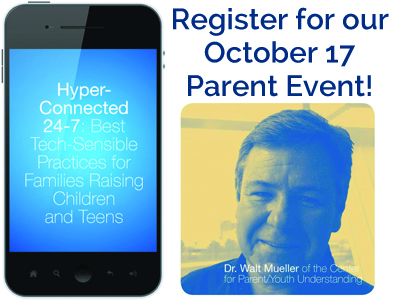As a technologist, I often get questions about family use of the Internet. Here are some ideas about how to protect your family from potential dangers on the Internet, as well as how to use the Internet in positive ways.
Defensive Strategies
1) Instruct and supervise.
Young children should never use the Internet unsupervised; they're not yet able to distinguish helpful from harmful content. They need to be extensively instructed and, as they mature, given independence gradually.
 2) Content filters.
2) Content filters.
Use a content filter to block inappropriate content. The best place to start is dns.norton.com. It's free and relatively easy to set up. However, realize that a content filter doesn't catch everything, and a determined kid can find ways around it.
3) Out in the open
Keep computers in public places in your house, to make it easier for you to supervise and to make it harder for people to do things secretly.
4) Wary of personal connections
Be especially careful with direct personal interaction in chat rooms, discussion forums, email, private messaging within Facebook, etc. People aren't necessarily who they claim to be, and sexual predators are very sophisticated - they know where to find kids and how to deceive and manipulate them.
5) Ideas matter
As with books, music, movies, TV, etc., we should ask about everything on the Internet: What is it saying? What is its message? What unspoken assumptions are being reinforced? Is it telling the truth or lying? Is it teaching us to be wise or foolish? Kids must be trained to ask these questions constantly and not allow bad ideas to take root in their hearts (See Romans 12:2).
6) The heart of pornography
A content filter helps, but it won't stop kids who want to find it. They must be trained to avoid it, preferably before the age that hormones make it a strong temptation. This starts with learning what the Bible says about it: "…whoever looks at a woman to lust for her has already committed adultery with her in his heart." (Matt 5:28) This is deliberate, purposeful looking - looking in order to produce a sexual response in the looker, which is exactly what porn does. For further reading on this topic, I recommend the book Fidelity by Douglas Wilson.
7) Active vs. passive
Spend less time passively consuming random content at places like Facebook and YouTube, and more time actively researching, learning, and participating in substantive discussion forums, visiting sites like KhanAcademy and Wikipedia.
Offensive Strategies
It's a mistake for families only to be defensive about the Internet. We also need to be offensive. Look for ways to use the Internet positively - to help you and your children grow in knowledge, wisdom, and virtue and to extend God's kingdom.
 Using technology to develop & pursue interests & skills
Using technology to develop & pursue interests & skills
We have tried to encourage and support all of our kids in pursuing their interests. Nowadays, the Internet is an important tool in pursuing almost any endeavor. The following examples show some positive ways our kids have used the Internet in developing their skills and interests and the positive effects it has had on their lives.
My son, Peter, loved the Redwall children's books when he was a kid, and he built a website for kids interested in Redwall. It was an online club, where kids could publish art and creative writing. He has maintained a deep interest in literature and art, now works as a software engineer, and is writing his first novel.
My son, David, became interested in magic and joined an online discussion forum for magicians. He became an expert magician and then began creating new magic tricks and publishing training videos to teach them to other magicians, which was very lucrative for him in his teen years. This led to an interest in film-making and, eventually, working at an e-learning company and now at a start-up technology company in the film industry.
My daughter, Priscilla, operated a home-based chocolate business, starting at age 14. She started out marketing by email and then created her own e-commerce website and business Facebook page. She is now pursuing a career as a pastry chef.
Different families have unique gifts/talents, family cultures, and callings. Your family's positive use of the Internet may look very different from ours, but I encourage you to discuss, pray, and brainstorm together about it.








